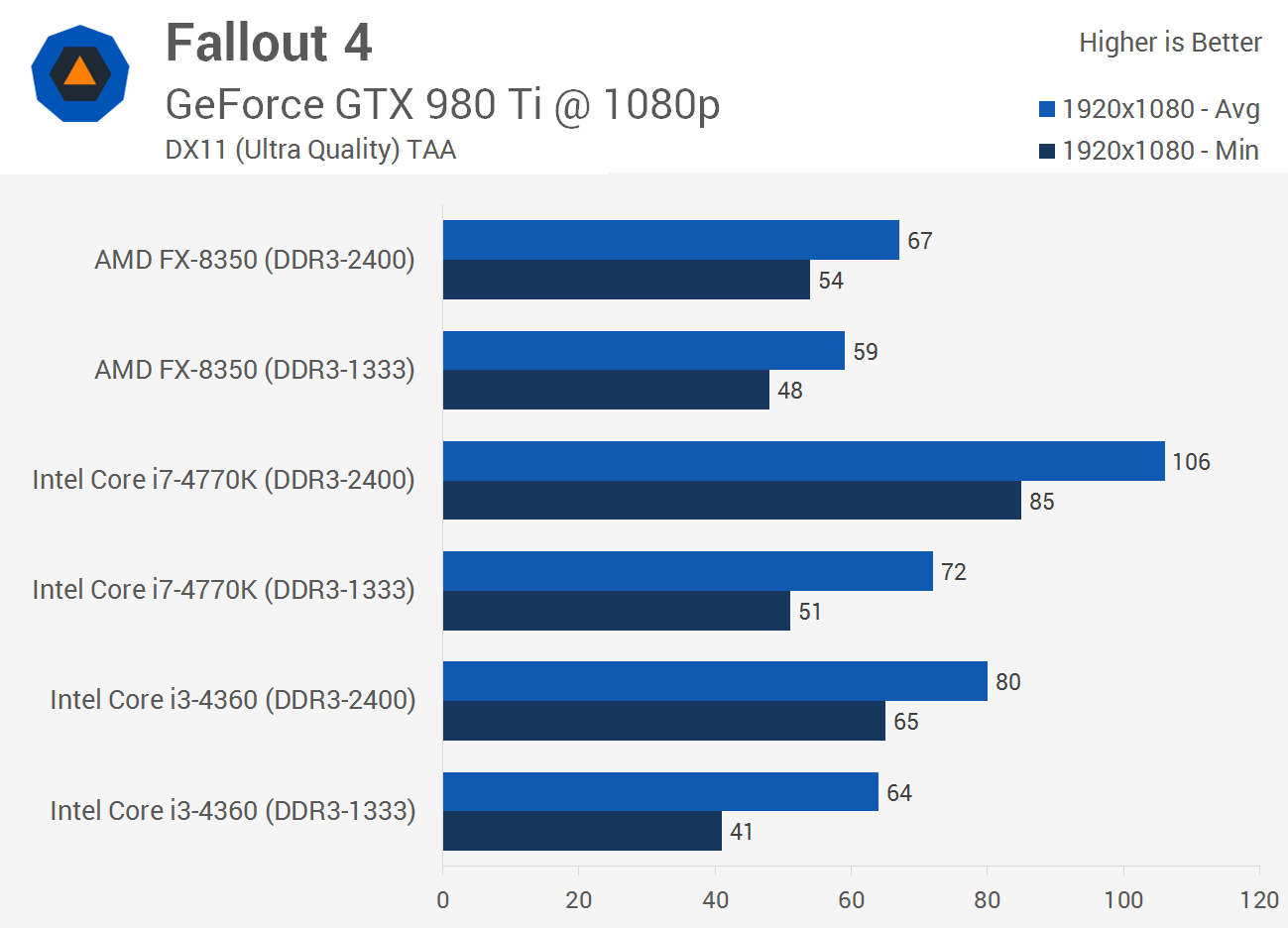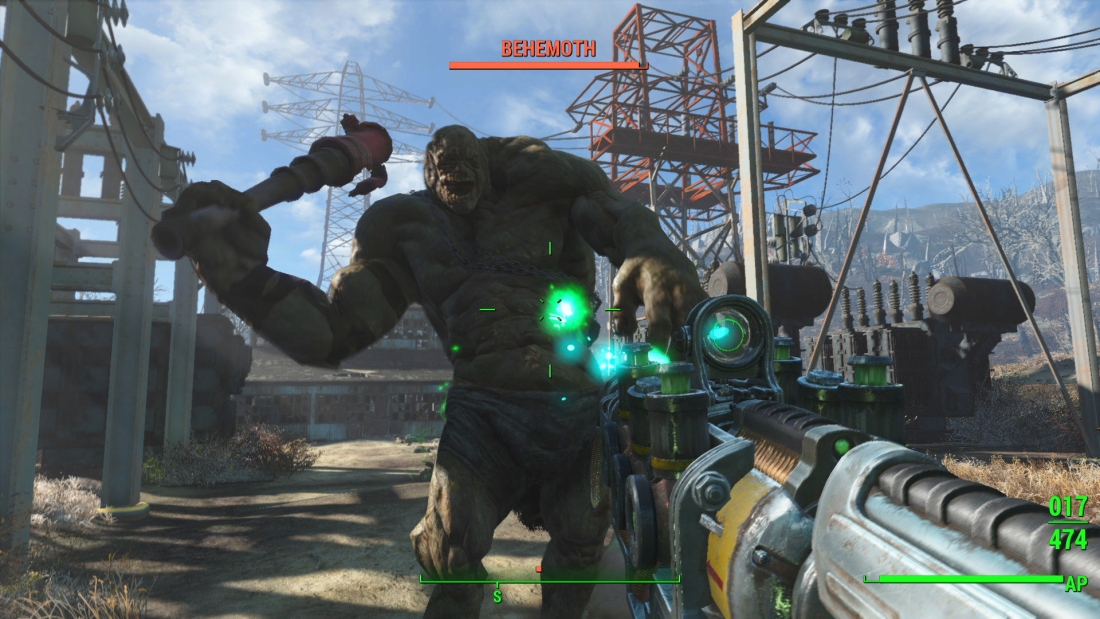Memory Performance & Wrap Up
When benchmarking the Intel Haswell processors, the memory speed in the BIOS kept reverting back to 1333MHz (was an issue with the BIOS which has now been fixed) at every processor change rather than holding the DDR3-2400 XMP (Extreme Memory Profile). At first we accidently tested the Core i7-4770K with the memory clocked at 1333MHz and were perplexed by the much weaker than expected performance.

It was quickly spotted that the memory was running much slower than it ought to be, though we weren't entirely sure this was the cause of the massive deficit. Turns out it was, as moving the memory back up to 2400MHz resulted in a massive 67% increase in minimum frame rate for the Core i7-4770K.
A similar situation was found with the Core i3-4360, which went from a minimum of 41fps with DDR3-1333 memory to a minimum of 65fps with DDR3-2400.
Yes, we know there's a significant difference between the now obsolete 1333MHz memory speed and 2400MHz, but from memory I don't recall it having anything like that kind of impact on gaming performance. Interestingly the same variation in memory speeds had little impact on the AMD FX-8350's performance, as the processor was just 13% faster with the quicker memory.
Anyway, we found this interesting and it would suggest that Fallout 4 fans with Intel hardware will want to ensure they are running their memory as fast possible.
Conclusion
Folks looking to play Fallout 4 with the highest possible quality settings will want a reasonably powerful GPU, even at 1080p. For a minimum of 60fps, you'll need a GeForce GTX 780 or Radeon R9 290, or the R9 390/GTX 970 from the current generation. Even those seeking an average of 60fps will want a GTX 960 or R9 380/280X/7970 GHz.
Playing at 2560x1400 was surprisingly demanding and here most gamers will have to settle with an average of 60fps if they are lucky. The original GTX Titan for example was good for an average of 59fps, making it slightly slower than the R9 390X and slightly faster than the 290X.
All bets are off at 4K. It's high-end SLI/Crossfire or nothing, really.
No doubt some of you will look at the screenshots and claim that Fallout 4 is poorly coded and optimized. I would have to disagree.
Yes, the graphics aren't overly impressive – the texture quality is certainly much lower than we were expecting – but there is a high level of detail overall, especially with the distance options cranked up, which creates eye-candy as far as you can see.
If you play at 4K and you're buying this release even partially for the visuals, Fallout 4 is a must-have title. Its rendering distance is incredible and the high pixel count at 4K really shows it off. It's just a shame you need to spend almost $2,000 on graphics cards to fully enjoy it.
Fallout 4 is an Nvidia GameWorks title and while performance isn't as good as it could be on AMD hardware, without a driver specifically tailored for the game yet we weren't that disappointed. Hopefully AMD can better optimize its software in the near future to give Radeon GPUs a little more performance and get them where they belong.
When it comes to CPU performance we found Fallout 4 to be far more demanding than expected. This is one of the few titles that show the Core i7 processors delivering an advantage over their non-HT Core i5 parts. Unfortunately, once again we find the same old story when looking at any game that is remotely CPU dependent: AMD suffers in a big way.
AMD fans will no doubt find it hard to watch the flagship FX-9590 going head to head with the previous-generation Core i3 range, but that is the current situation and Zen can't get here fast enough.
Fallout 4 is another nail in the dual-core processor's coffin and although the low-end Pentium and Celeron processors produced playable frame rates when looking at the averages, they often dipped down to unplayable frame rates in the 20s.
Those running a Core i5 or Core i7 processor clocked at around 4GHz won't have much to gain from overclocking further, but if you're using the unlocked Pentium G3258 then we suggest going for gold. AMD's FX series will also benefit from overclocking, though they are coming from so far back it is an impossible margin to make up, even if you go postal and break out the liquid nitrogen.
Fallout 4 isn't particularly heavy on system memory, using less than 4GB of RAM for the most part, and it is also light on VRAM using a little over 2GB at 1080p. Interestingly, however, Intel's Core processors benefit massively when paired with high-speed memory in Fallout 4, as we saw minimum frame rates increase by almost 70% when going from DDR3-1333 to DDR3-2400.



